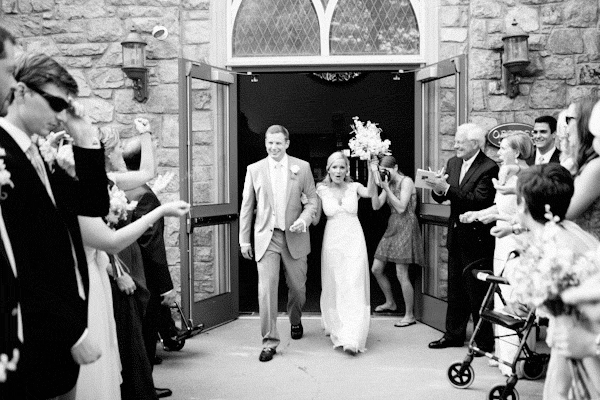
I love these shots because the guests are participating in the wedding rather than documenting!
All of my clients know that their wedding experience is very important to me—just as important as the quality of photos that I’m making during the day. I want to make sure that the bride and groom are having the best day of their lives and that their guests are also enjoying themselves. So my work style is pretty flexible and I don’t have rules like some other wedding photographers, demanding that no other guests are taking photos during the ceremony or formal portrait times or that guests do not use flash. I like being laid back about these things but at one of my weddings this summer I had my second photographer get a camera to the head by an amateur photographer who wasn’t paying attention. This caused us both to miss an important shot.
I was very angry about this because we both had spent the
entire day working around other people and their cameras, stepping around four
others trying to get the same shot, and avoiding phones, iPads and digital
cameras in all our shots. And of course, it’s annoying when you take the time
to scout out a location with great light, position everyone perfectly and adjust
the details to get the best photo and someone is snapping away over your
shoulder. Even still, I can’t bring myself to impose restrictions on my wedding
clients.
Instead, I’ll offer a few tips from a professional for guests who wish to take
photos at weddings:
1. When guests are taking photos over my shoulder some of the
people in the photo will inevitably not be looking at my camera and looking at
the other photographer. It happens every time. If you want the bride and groom
to have at least one nice photo, let me get the shot first before you take
yours. That’s what I’m getting paid for.
2. Before you hold your phone, iPod, iPad, or digital camera
above your head to get a photo, look behind you to make sure you didn’t step
right in the way of someone else’s view or right in front of my camera. And
before you take the photo, ask yourself: “Am I actually going to use this photo
for anything?” Sometimes, it’s more worthwhile to just experience an event than
to spend the time getting a few mediocre photos.
3. This may not be the same for other people’s weddings but my
clients spend a significant amount of money to work with someone who has backup
equipment, backup plans, and a workflow that makes it extremely unlikely that
the wedding photos will be botched. Taking all the same photos I do “just in case” is not worth your time
or energy, and it’s much more likely that you will ruin one or more of my
shots.
4. Rather than copy my shots, do take photos of things I don’t
see or can’t get to. It’s a nice surprise for the couple when you get a shot
that I can’t.
I don’t think it’s my place to tell wedding guests what they
can or can’t do with their cameras. I do think I should educate my clients, who
in turn can educate their guests, about how amateur photography affects their
wedding photography investment. Sharing this information may prevent over-documentation
at your wedding, free your guests from pressure to electronically prove they
are attending your wedding, and help your photographer get beautiful and
device-free shots.

No comments:
Post a Comment